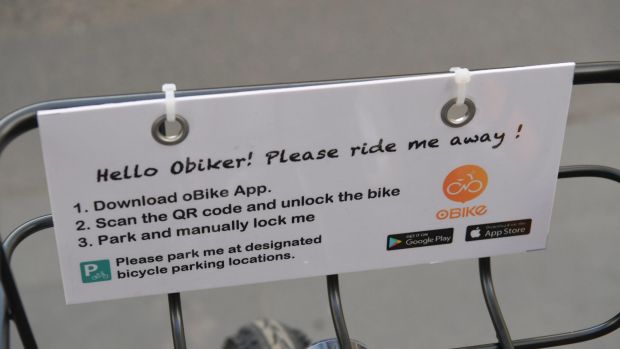You may have already seen them on your way to work.
Shiny yellow bicycles scattered around the city with inviting signs that read "Please ride me away" and not a chain in sight.

But far from being a random act of charity, these humble pushies are part of a hi-tech new bike-sharing platform.
Singaporean company oBike has released several hundred of them onto city streets as a direct competitor to Melbourne's RACV blue bikes.

Believed to be the first business of its kind in Australia, oBike's launch has posed a fresh set of problems for local councils about how to police them and regulate quality.
As a dockless bike sharing system, oBike differs radically from the existing Melbourne Bike Share system.
The bikes are left in public parking areas and are unlocked remotely via a mobile phone app.
This means users can pick up and drop off a bike anywhere they like, as opposed to returning it to a designated docking station.

The cost is $1.99 per 30 minutes with initial plans to cover the CBD, Brunswick, South Yarra, Fitzroy, St Kilda, and Carlton. Helmets are included.
The company launched 12 months ago and boasts 60,000 daily trips in Singapore. There were 170,000 trips taken on RACV bikes between July 2015 and June 2016.

But can oBike's success overseas be translated here?
Councillor Nicolas Frances Gilley, who chairs the transport portfolio for Melbourne City Council, said the council's goal is a city focused on walking and cycling.

Mr Gilley acknowledged the city had "radically changed" since the council wrote their transport strategy four years ago.
"Bike sharing had its place but we have spent the past four years going 'we know this place doesn't work'."

"We know how people want to use bicycles now. We want people to be able to have cheap bikes, put them everywhere and have people able to use them."
But Mr Gilley defended Melbourne Bike Share against criticism, saying it had worked hard to adapt to its biggest drawbacks including helmet rental.
The publicly funded scheme is run by the state government. In the April State Budget, the Andrews government committed $4.9 million to continue the initiative.
An RACV spokeswoman said they operated the system on behalf of Public Transport Victoria and called it an "easy and inexpensive way to get around central Melbourne".
"[It] is sustainable, integrated into Melbourne's transport network, and part of Melbourne's culture with the iconic blue bikes."
Technology investor Richard Celm, a program director at startup accelerator Startupbootcamp, said the city needed to invest in new technology to maintain its place as one of the world's most liveable cities.
"Giving people the option of jumping on a bike for short trips around the city has a number of significant benefits," he said.
"It reduces vehicles on the road which improves air quality, reduces congestion, and means there is less need for roadside parking which gives a huge amount of lost space back to the city and its people."
Mr Celm said a failure to implement the right technology would see Melbourne's infrastructure fail to keep up with the demands of a growing population.
oBike will run on a self-regulating system where users report faulty or broken bikes in return for credit on their account.
Users who do the wrong thing such as locking the bike inside their house will have their account penalised.
Several hundred bikes were released into the CBD on Thursday as a pilot test, with a full launch to follow in coming months.
For more information, visit the oBike Australia website here.

0 comments
New User? Sign up